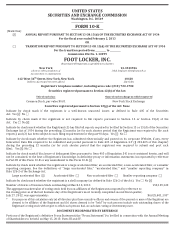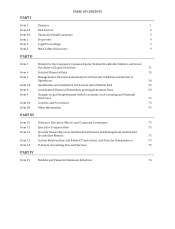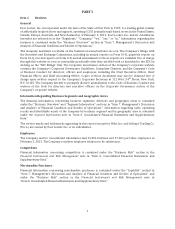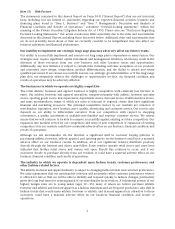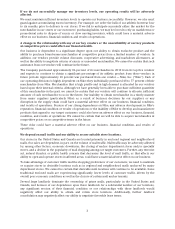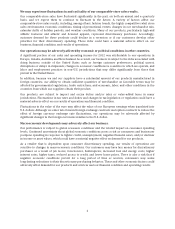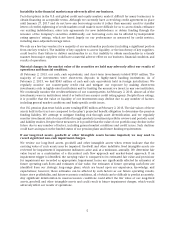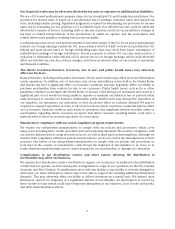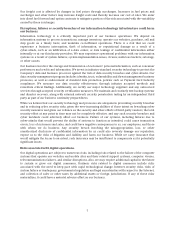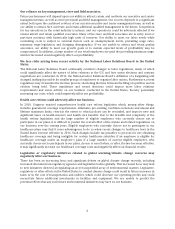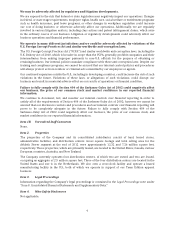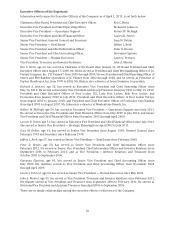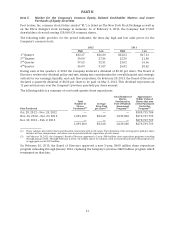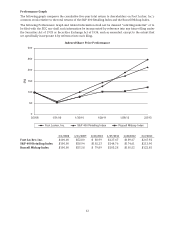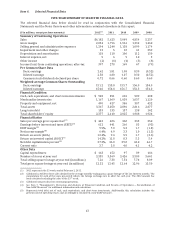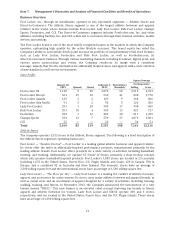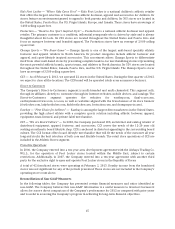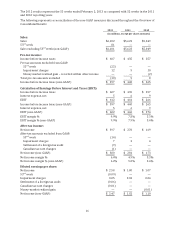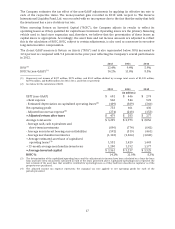Foot Locker 2012 Annual Report Download - page 27
Download and view the complete annual report
Please find page 27 of the 2012 Foot Locker annual report below. You can navigate through the pages in the report by either clicking on the pages listed below, or by using the keyword search tool below to find specific information within the annual report.Our freight cost is affected by changes in fuel prices through surcharges. Increases in fuel prices and
surcharges and other factors may increase freight costs and thereby increase our cost of sales. We enter
into diesel fuel forward and option contracts to mitigate a portion of the risk associated with the variability
caused by these surcharges.
Disruptions, failures or security breaches of our information technology infrastructure could harm
our business.
Information technology is a critically important part of our business operations. We depend on
information systems to process transactions, manage inventory, operate our websites, purchase, sell and
ship goods on a timely basis, and maintain cost-efficient operations. There is a risk that we could
experience a business interruption, theft of information, or reputational damage as a result of a
cyber-attack, such as an infiltration of a data center, or data leakage of confidential information either
internally or at our third-party providers. We may experience operational problems with our information
systems as a result of system failures, system implementation issues, viruses, malicious hackers, sabotage,
or other causes.
Our business involves the storage and transmission of customers’ personal information, such as consumer
preferences and credit card information. We invest in industry-standard security technology to protect the
Company’s data and business processes against the risk of data security breaches and cyber-attacks. Our
data security management program includes identity, trust, vulnerability and threat management business
processes, as well as enforcement of standard data protection policies such as Payment Card Industry
compliance. We measure our data security effectiveness through industry accepted methods and
remediate critical findings. Additionally, we certify our major technology suppliers and any outsourced
services through accepted security certification measures. We maintain and routinely test backup systems
and disaster recovery, along with external network security penetration testing by an independent third
party as part of our business continuity preparedness.
While we believe that our security technology and processes are adequate in preventing security breaches
and in reducing cyber security risks, given the ever-increasing abilities of those intent on breaching cyber
security measures and given our reliance on the security and other efforts of third-party vendors, the total
security effort at any point in time may not be completely effective, and any such security breaches and
cyber incidents could adversely affect our business. Failure of our systems, including failures due to
cyber-attacks that would prevent the ability of systems to function as intended, could cause transaction
errors, loss of customers and sales, and could have negative consequences to us, our employees, and those
with whom we do business. Any security breach involving the misappropriation, loss, or other
unauthorized disclosure of confidential information by us could also severely damage our reputation,
expose us to the risks of litigation and liability, and harm our business. While we carry insurance that
would mitigate the losses to an extent, such insurance may be insufficient to compensate us for potentially
significant losses.
Risks associated with digital operations.
Our digital operations are subject to numerous risks, including risks related to the failure of the computer
systems that operate our websites and mobile sites and their related support systems, computer viruses,
telecommunications failures, and similar disruptions. Also, we may require additional capital in the future
to sustain or grow our digital commerce. Business risks related to digital commerce include risks
associated with the need to keep pace with rapid technological change, Internet security risks, risks of
system failure or inadequacy, governmental regulation and legal uncertainties with respect to the Internet,
and collection of sales or other taxes by additional states or foreign jurisdictions. If any of these risks
materializes, it could have a material adverse effect on our business.
7




